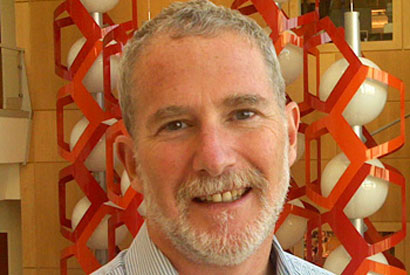UC Berkeley professor and structural biologist Thomas Alber dies at 60
Thomas Alber, a UC Berkeley structural biologist known for his striking ability to choose important biological problems and attack them with elegant biochemical and structural studies, died peacefully on March 28, 2014, at his home in Berkeley, Calif.

April 4, 2014
Thomas C. Alber, a structural biologist known for his striking ability to choose important biological problems and attack them with elegant biochemical and structural studies, died peacefully on March 28, 2014, at his home in Berkeley, Calif.
Alber celebrated his 60th birthday in January, a major milestone after a five-year battle with amyotrophic lateral sclerosis, a neurodegenerative disease often called Lou Gehrig’s disease, which sapped his strength but not his spirit.
 At the time of his death, Alber was a professor of molecular and cell biology at the University of California, Berkeley, where he held the Chancellor’s Class of ’43 Chair. He was also the founding director of the Henry Wheeler Center for Emerging and Neglected Diseases, a faculty affiliate in the California Institute for Quantitative Biosciences (QB3), and a member of the Lawrence Berkeley National Laboratory division of physical biosciences.
At the time of his death, Alber was a professor of molecular and cell biology at the University of California, Berkeley, where he held the Chancellor’s Class of ’43 Chair. He was also the founding director of the Henry Wheeler Center for Emerging and Neglected Diseases, a faculty affiliate in the California Institute for Quantitative Biosciences (QB3), and a member of the Lawrence Berkeley National Laboratory division of physical biosciences.
In 2013, Alber received the Christian B. Anfinsen Award of the Protein Society for “his foundational studies yielding an understanding of the structure/function relationship of proteins.”
“He was known for his ability to span a wide range of scientific disciplines, to see connections between disparate fields and to extract fundamental insights from complex data sets,” said long-time friend and colleague Susan Marqusee, professor of molecular and cell biology and QB3-Berkeley director. “In addition to his impact on science, he’ll be remembered for his scientific integrity, collegial spirit, mentorship and intellectual enjoyment of collaborations.”
While X-ray crystallography had been used for decades to determine the static structures of proteins, Alber, who received his Ph.D. in biology from the Massachusetts Institute of Technology in 1981, developed novel computational methods to interrogate X-ray data to reveal previously hidden alternative structures that can have critical roles for protein function within living cells. He also discovered a sophisticated system of protein communication within Mycobacterium tuberculosis, the causative agent of TB, and identified proteins within this communication system that can be targeted with new drugs.
Alber also discovered new potential targets for therapeutic intervention against HIV/AIDS through his structural and biochemical studies of a large protein complex required for the expression of HIV genes inside cells.
Alber’s passion for science continued throughout his life, including publishing an impressive number of papers in his last year, according to Marqusee.
His colleagues recalled the enthusiasm with which he lived his life outside of the laboratory and classroom. He loved watching his three children realize their special talents, was an avid hiker, a fearless climber, a determined long distance runner who took on marathons, and a graceful skier. Up until the last days of his life, he was writing papers, meeting with colleagues and friends, and enjoying the Bay Area’s natural beauty, Marqusee said.
He is survived by his children, Josh (19), Emily (17) and Mackenzie (13), and their mother Julie Nye; and his brothers William of Walnut Creek, Calif., Chad of Boulder, Col., and Don of Seattle, Wash.